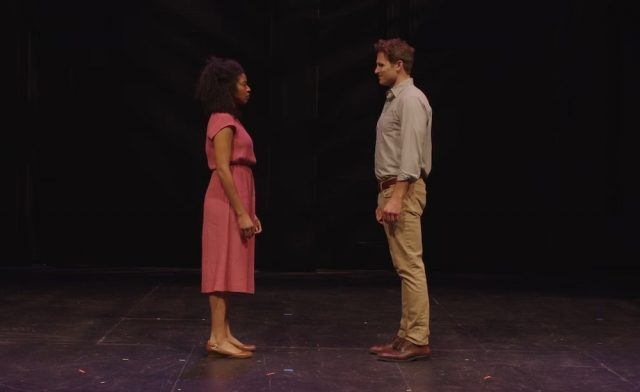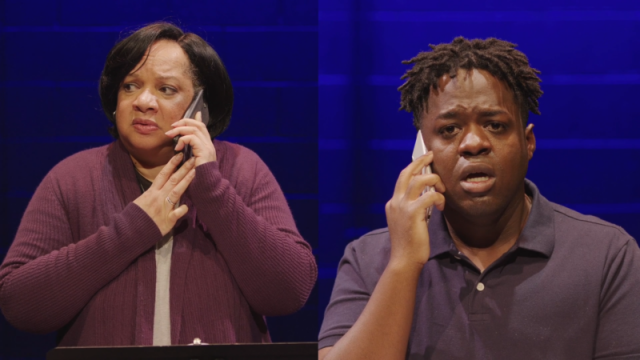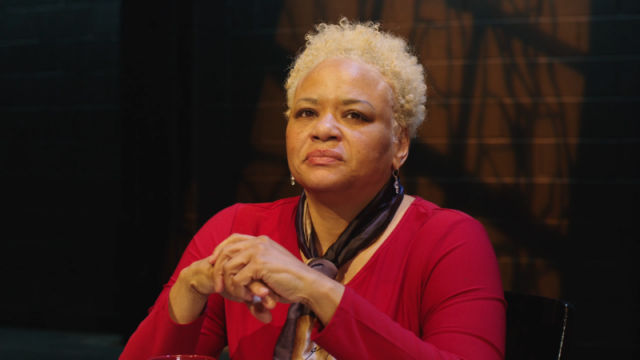
Juliana Canfield and Michael Sweeney Hammond face off in Adrienne Kennedy’s He Brought Her Heart Back in a Box (photo courtesy Round House Theatre)
Round House Theatre / McCarter Theatre Center
Extended through April 30, digital festival pass $60
www.roundhousetheatre.org
www.mccarter.org
Round House Theatre in Maryland and McCarter Theatre Center at Princeton have teamed up to deliver an extraordinary gift during the pandemic lockdown. Continuing through April 30, “The Work of Adrienne Kennedy: Inspiration & Influence” is a fabulous crash course in all things Adrienne Kennedy, consisting of staged readings of four of the eighty-nine-year-old Pittsburgh native’s avant-garde plays, filmed onstage at the Round House without an audience, along with four panel discussions. I am embarrassed to admit that I knew relatively little about Kennedy and had seen only two of her works, the Signature’s 2016 revival of her 1964 debut, Funnyhouse of a Negro, and TFANA’s 2018 world premiere of He Brought Her Heart Back in a Box. That last work is the shining star of the virtual program, which celebrates Kennedy’s uncompromising fierceness, her unique use of narrative, and her brilliant understanding of such issues as race, slavery, whiteness, and power in America.
Directed by Nicole A. Watson, He Brought Her Heart Back in a Box is one of the best plays of the coronavirus crisis. Inspired by events in her own life and featuring snippets from Noël Coward’s Bitter Sweet and Christopher Marlowe’s The Massacre at Paris, the half-hour show, introduced by Jeremy O. Harris and with stage directions read by Agyeiwaa Asante, takes place during WWII, in the fictional town of Montefiore, Georgia. The white Christopher (Michael Sweeney Hammond), heir to a successful local business, is declaring his love for Kay (Juliana Canfield), the daughter of a white writer and a Black woman who died mysteriously shortly after Kay was born. Christopher doesn’t seem to fully comprehend the dilemma of their potential relationship, especially as Kay learns more about what happened to her mother.
At TFANA, you could check out a miniature model of the town; here Watson incorporates models presented to us in a person’s hands, a miniature house, graveyard, and train car and station onto and through which she projects images of racism in the Jim Crow south, ingenious stagecraft that could only be this effective onscreen, shot in close-up by cinematographer Maboud Ebrahimzadeh, with visual effects by Kelly Coburn and editing by Joshua Land of Mind in Motion. Canfield and Hammond, who also portrays the father, deliver most of their lines while at music stands, socially distanced but intrinsically tied together. Simply dazzling.

Kim James Bey and Deimoni Brewington play mother and son in Adrienne Kennedy’s Sleep Deprivation Chamber (photo courtesy Round House Theatre)
Original director Michael Kahn introduces Kennedy’s very personal 1996 play, the Obie-winning Sleep Deprivation Chamber, which she wrote with her son, Adam P. Kennedy, about something that actually happened to him. Driving home one day, just down the street from his father’s house, a Black man is pulled over by a white police officer and is brutally beaten. It’s winter, and the Antioch College Theatre Department is rehearsing Hamlet. “Ophelia, betrayal, disillusionment,” five students announce twice, establishing the tone of the play. Kim James Bey stars as Adrienne Kennedy alter ego Suzanne Alexander, mother of Teddy (Deimoni Brewington), who was visiting his dad, David Alexander (Craig Wallace), in Arlington, Virginia, where the incident occurred.
Director Raymond O. Caldwell cuts between Suzanne reading letters she has sent in defense of her son; Teddy on the stand, describing what happened in detail; his older brother, March (Marty Lamar), speaking on a terrace; Teddy’s lawyer, Mr. Edelstein (David Schlumpf), trying to convince the prosecutor, Ms. Wagner (Jjana Valentiner), that they can come to an agreement without going to trial; David Alexander testifying about what he saw; flashbacks from Suzanne’s life, with other actors playing a younger version of her and other characters (Imani Branch, Sophia Early, Janelle Odom, Moses Princien, and Kayla Alexis Warren); and Officer Holzer (Rex Daugherty) giving his side of the story of the encounter. The constant shifting in time and space, along with dream scenes and surreal touches, furthers the confusion surrounding the event, one that is all too representative of what the Black Lives Matter movement is battling against. It’s a powerful if familiar story, handled with grace and anger.
“I was asked to talk about the violent imagery in my work, bloodied heads, severed limbs, dead father, dead Nazis, dying Jesus,” Suzanne (Lynda Gravatt) says at the beginning of Ohio State Murders, repeating words she stated in Sleep Deprivation Chamber. Introduced by Awoye Timpo and Arminda Thomas of Classics, Ohio State Murders, published in 1992, offers a different perspective on Suzanne, who is played in flashbacks by Billie Krishawn set between 1949 and 1952. The modern-day Suzanne is in the library at Ohio State, delivering a speech about what occurred when she was a student there, involving her English teacher, Robert Hampshire (Daugherty).
It’s a sordid tale of racism, sex, and murder that brings to life earlier episodes from her time at college, filmed in black-and-white, as the younger Suzanne faces her complicated situation with her aunt Louise (Andrea Harris Smith), her ex-boyfriend Val (Yao Dogbe), her new friend David Alexander (Dogbe), and her roommate, violinist Iris Ann (Heather Gibson). Along the way she learns about Sergei Eisenstein, Thomas Hardy, and the importance of symbols. Directed by Valerie Curtis-Newton, the hourlong work is poignant and sharp, the flashback scenes like a kind of noir mystery. Unfortunately, Gravatt, who tells the story from start to finish, never quite finds the right rhythm in her narration, emphasizing the wrong words and reading too obviously, which is a shame, because the language is powerful and poetic. But Krishawn is mesmerizing as Kennedy’s young alter ego.

Caroline Clay gives a dazzling solo performance in Adrienne Kennedy’s Etta and Ella on the Upper West Side (photo courtesy Round House Theatre)
Caroline Clay is exquisite as the narrator in the world premiere of Etta and Ella on the Upper West Side, hitting all the right notes. The play, directed by Timothy Douglas, is like an interwoven short story, set in Manhattan, as two sisters, Ella and Etta Harrison, fight over men, writing, and hairdos. Sitting at a table in front of the brick wall at the back of the stage, Clay discusses musician and writer Troupe, the Vanishing Literary Club, and murder — yes, another reference to Ohio State Murders and Sleep Deprivation Chamber — in a captivating matter-of-fact way while her eyes search the space and notes appear on the screen. (For example, “sometimes he walks to the roof of the brownstone and looks to the Harlem” and “suddenly Etta stood up.”)
About ten minutes in, the narrator gets to the heart of the dilemma. “‘Ella, I’ve asked my editor, can I stop you from writing articles about me?’ He told me to leave you alone. I told him you’re making me sick. ‘I think if you leave her alone, she’ll stop. I don’t want to upset you, Etta, but I saw parts of manuscript she submitted to Grove on you. Do you want to see it? I took a look to see if she’s violating your legal rights. I feel this is leading to something terrible between you.’” Who has the right to tell whose story has become a major issue over the last few years.
Kennedy’s words sing as the narrator describes characters’ clothing, their quirks, and their desires as they meander through New York City, from the Upper West Side and the Hudson River to the Strand and the East Village, and lament what happened to old, treasured movie theaters like the Thalia and the New Yorker. Kennedy draws a pretty picture of the metropolis as she focuses in on the relationship between two sisters who are practically clones of each other.
Kennedy — the first syllable of her first name is pronounced “ah,” not “ay” — deserves to be more famous than she is, her acclaim currently relegated to the inner circle of theater people, but this program should go a long way to spreading the word about just how important she is to the canon. “The Work of Adrienne Kennedy: Inspiration & Influence” is a fitting tribute to one of America’s most talented playwrights, a fearless woman who has taken on the status quo for five decades, tackling difficult subjects with elegance and beauty, revealing the dark underbelly of a nation unable, and unwilling, to reckon with its past. After experiencing these four tales, you’ll never miss another Adrienne Kennedy play when it comes to your town.
You can take a deeper dive by watching the four talks, which are available for free: “Influence & Imagination,” with Eisa Davis, Zakiyyah Alexander, and Haruna Lee; “Acting Adrienne Kennedy,” with Watson, Clay, Crystal Dickinson, and Mikéah Ernest Jennings; “Critical Reflections,” with Jill Dolan, Rohan Preston, and Regina Victor; and “The Black Avant Garde,” with Caldwell, Daniel Alexander Jones, and Holly Bass.